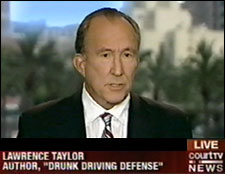Is There a Breathalyzer in Your Car’s Future?
Posted by Lawrence Taylor on August 25th, 2015Do you think the dashboard in your new car is already filled with electronic gizmos? You open the door, sit down and in front of you are a dazzling array of dials, buttons, analog and digital displays, screens, backup camera, audio options, ignition, Bluetooth, climate controls, ad nauseum.
How about adding a breathalyzer to that dashboard?
Sen. Chuck Schumer Pushes High-Tech Solution to Drunk Driving
Wash, D.C. Aug. 7 – Sen. Chuck Schumer is racing to install new technology in cars that could put a stop to drunk driving, saving up to 7,000 lives per year.
The Driver Alcohol Detection System for Safety — revealed last month by the National Highway Traffic Safety Administration — uses touch- and breath-based systems to detect if a driver has had too many drinks. If the systems detect that the driver’s blood alcohol level is above the legal limit, the car shuts down.
The high-tech solution has been in the works since 2008 through a partnership between the NHTSA and Automotive Coalition for Traffic Safety, but it won’t hit production for several years, researchers say. To speed up the process, Schumer is co-sponsoring a bill that would funnel $48 million in federal funding to the project over six years…
Presumably, these dashboard breathalyzers will not be options, but will be required by federal or state law — either as mandatory equipment on new cars, or as required additions to used cars. This would probably be required by federal law or, as with the .08% blood-alcohol laws, by state laws passed under threat of withholding federal highway funds.
Sounds like a great idea, right? But what is never mentioned about these devices are the drawbacks:
* Accuracy. As with breathalyzers used in police stations, these machines have to be constantly calibrated
* Reliability. Police breathalyzers are in police stations; how reliable and accurate will one be subjected to bumpy roads and high-speed driving?
* Fraud. What’s to stop a driver from having his passenger or anyone else breath into the device?
* Emergency situations. What if there is a sudden emergency requiring immediate driving?
* Maintenance. How often, where and at what cost must the machines be maintained or repaired?
* Safety. What happens if the breathalyzer malfunctions and shuts down the vehicle — on a freeway at 65 mph?
As I’ve mentioned repeatedly in the past, law enforcement breath-testing machines — even when maintained, calibrated and operated correctly — are inaccurate and unreliable. See, for example, Breathalyzer Accuracy. How accurate and reliable will a much smaller and cheaper version be that is mounted in a car driven for hours at varying speeds and road conditions?


